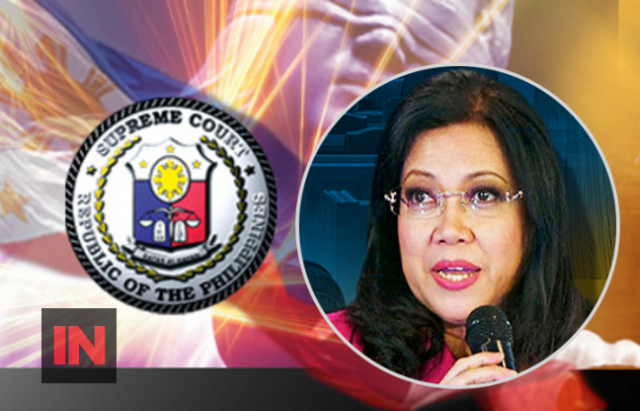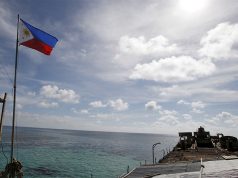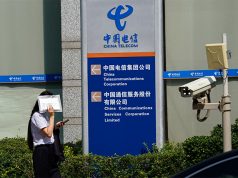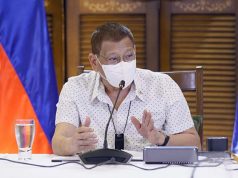The Judicial and Bar Council had ended up waiving the requirement for all aspirants for the position of chief justice in 2012 to submit “all” previous Statements of Assets, Liabilities and Net Worth (SALNs) up to December 31, 2011, after 14 of the candidates could not comply.
A spokesperson for Chief Justice Maria Lourdes Sereno made this clarification to correct the misconception that the JBC had a standing 10-year SALN requirement, and after two Supreme Court justices made public their respective certifications from the JBC that they submitted at least 10 SALNs when they also applied for the top judicial post nearly six years ago.
“We want to clarify that in 2012 the JBC did not merely require 10 years, but all previous SALNs up to 31 December 2011 for those in government,” lawyer Josa Deinla said, citing a JBC announcement on the vacancy of the chief justice post in 2012 that was published in newspapers.
Deinla noted that it was Associate Justice Teresita Leonardo De Castro who first brought up the baseless 10-year SALN requirement in one of her many appearances before the House Committee on Justice, where she willingly testified in support of what the Sereno camp described as “the fatally defective impeachment complaint” filed by lawyer Lorenzo Gadon.
“With all due respect, the claim that the JBC required only 10 years of SALNs was Justice De Castro’s self-serving assertion that is contradicted by the JBC’s own announcement and its records,” Deinla said.
Contrary to De Castro’s claim, the 2012 JBC announcement stated that the candidates for chief justice, in addition to other requirements, must submit “all previous SALNs (up to 31 December 2011) for those in the government or SALN as of 31 December 2011 from those from the private sector.”
Deinla also clarified that the filing of SALNs by those in government was imposed not just in Republic Act No. 6713, or the Code of Conduct and Ethical Standards for Public Officials and Employees.
“SALNs were already required under RA 3019 (Anti-Graft and Corrupt Practices Act) which was enacted as early as 17 August 1960,” she explained.
“After the 1987 Constitution took effect, RA 6713 expanded the requirement to include spouses and unmarried children. RA 6713 took effect on 25 March 1989,” Deinla added.
In 2012, De Castro and then Acting Chief Justice Antonio Carpio were also candidates to replace Chief Justice Renato Corona, who was removed from his post following his conviction by the Senate impeachment court. They both failed to meet the JBC requirement of all SALNs, along with Sereno and 11 other candidates.
Records would show that De Castro has been in government service since 1973, thus under the JBC original requirement, she was bound to submit 39 SALNs. However, she could only submit 15 SALNs.
In the case of Carpio, he submitted to the JBC his SALNs when he was a member of the high court from 2001-2012 but he could not complete his SALN submissions when he was Chief Presidential Legal Counsel from 1992-1996. He could only submit to the JBC his SALNs for 1992-1994.
As a result, the minutes of the July 20, 2012 JBC meeting stated that Carpio and De Castro were among those deemed to have “substantially complied.”
In Sereno’s case, she submitted to the JBC her 2009-2012 SALNs which she filed as SC Associate Justice. She resigned from the University of the Philippines in 2006 and went into private practice until her appointment to the high court in 2010.
With respect to her UP SALNs, Sereno told the JBC that since her records were more than 15 years old, it was not feasible for her to retrieve all the documents.
Therefore, considering that many of the candidates like Sereno, Carpio and De Castro could not comply, Deinla said, the JBC waived the requirement of complete submission of previous SALNs by all applicants.
“There is nothing irregular about the acceptance of the SALNs as substantial compliance even if the JBC originally required all previous SALNs,” Deinla pointed out. “The JBC could relax its requirement because the submission of SALNs is not a constitutional requirement but a JBC requirement which the council can waive.”
Besides, Deinla said, “mere non-submission of SALNs to the JBC is not proof of non-filing.”
Deinla also said that the fact that the JBC waived its requirement of the submission of all previous SALNs proves that “there is no basis for the quo warranto petition against CJ Sereno.”
Earlier, Senator Francis Escudero, who was a JBC member from 2008 to 2013, said the relaxed rule on SALN submission was not intended for Sereno.
According to Escudero, the rule on SALN had already been relaxed before Sereno applied for the position of associate justice in 2010.
He recounted that the JBC had been discussing the situation of former Associate Justice Roberto Abad, who could not complete his SALN filings for his service with the Office of the Solicitor General, when it relaxed the SALN rule.










